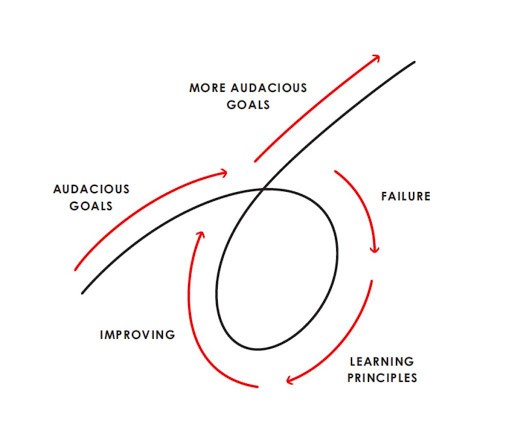"We are what we repeatedly do. Excellence, then, is not an act but a habit.." - Aristotle.
In the fast-paced world of software development, the secret to success lies not in coding marathons or burning the midnight oil, but in cultivating smart work habits that keep you ahead of the curve. But what are these habits, and how can you develop them while maintaining the quality of your work?
Ever scratch your head over the whole 'efficiency versus effectiveness' thing, and which one you should be chasing as a coder? Or maybe you've experienced those fleeting moments of intense motivation and wondered how to make them last.
Think about those times when you were faced with a problem, only to find yourself putting out fires instead of tackling the root cause. What if we told you there's a better way?
In this article, we'll delve into three powerful habits to transform your productivity as a software developer: when to optimize for efficiency and when to optimize for effectiveness, sustaining motivation, and addressing the core of problems. By the end of this journey, you'll be armed with the knowledge and tools to enhance your productivity and elevate your career to new heights – and most importantly, you’ll be confident that you can get your work done and have a life… even while everyone else is getting laid off.
Pick Whether Your Day Is Going To Be Efficient or Effective
Efficiency and effectiveness are two sides of the same coin, each with its importance in the software development lifecycle. However, understanding their differences is key to utilizing them to your advantage.
Alright, let's break down efficiency and effectiveness. Efficiency is all about getting stuff done with minimal time, effort, and resources - it's the art of avoiding waste. On the other hand, effectiveness is about delivering better, more valuable results - it's all about the quality of the outcome. Now, picture this: you're in the middle of a sprint, and you've knocked out a feature in record time - that's you being efficient. But if this speedy feature doesn't line up with the project's needs or doesn't boost value for the end-user, you're missing the mark on effectiveness. Efficiency is about your speed and production volume, while effectiveness is all about doing the right things - the things that add real value and get you closer to your end goal.
So, how do you balance efficiency and effectiveness? One method is by theming your days or weeks. Some days can be efficient days, where you focus on ticking off tasks on your to-do list, like debugging or documenting. Other days can be effective days, where you prioritize tasks that significantly contribute to the project's success, like designing a critical feature or improving user experience.
Here’s how I do it:
Monday | Tuesday |
Efficient Day (To Do’s, Pleasure, Priorities) | Effective Day (Priorities, To Do’s, Pleasure) |
To Do’s
Pleasure
Priorities
| Priorities
To Do’s
Pleasure
|
By theming your days, you allow yourself to switch between the fast-paced, quantity-focused efficient mode and the thoughtful, quality-focused effective mode. This switch not only enhances your productivity but also ensures that you're progressing in the right direction.
Creating Motivation
High performers have mastered self-awareness. They don't rely on external circumstances or fleeting feelings of inspiration – they know what they need in each moment so that they’re not wasting 45 minutes staring blankly at a screen. Instead, they have a set of daily habits that serve as their energy boosters, ensuring they are always ready to perform at their best.
One of these habits might be a morning jog. The act of running, the rhythmic pounding of feet on the pavement, the rush of endorphins - these serve as a physical boost, kickstarting their day and setting a positive tone. This physical activity is not just about maintaining fitness; it's a deliberate strategy to generate the motivation needed for the day ahead.
On other days, the energy boost might come from a mental activity. Reading a chapter of an insightful book, tuning into a thought-provoking podcast, or solving a complex problem - these mental exercises stimulate the mind, sparking curiosity and creativity. They serve as a mental boost, a way to energize the mind and prime it for the tasks at hand.
But the secret to their success isn't just knowing these strategies; it's understanding when to use them. By being self-aware and observant, high performers know whether they need a mental or physical boost on any given day. And they aren't afraid to use their biology to influence their psychology, or vice versa. They understand that the mind and body are interconnected, and leveraging one can often help overcome challenges in the other.
This approach to motivation isn't about waiting for the right moment or the perfect conditions. It's about actively creating the energy and drive needed to excel, regardless of the circumstances. And by doing so, high performers take control of their motivation, rather than leaving it to chance.
Identify The Root Cause
You know, when you look at people who excel in what they do, one thing stands out about how they tackle problems. They're not just about quick fixes or patching things up. They dig deep. They want to understand what's causing the issue. It's like they're detectives, hunting down the root cause. And because of that, they stick to the solutions they come up with - they're not just slapping on a Band-Aid.
Consider the scenario of gossip in a social or professional setting. Quite often, individuals react hastily to partial or inaccurate information, leading to misunderstandings or conflicts. However, high performers choose to react differently. Instead of jumping to conclusions, they invest time and effort in researching, reviewing, and understanding the situation in its entirety before formulating a response. Said more simply, they don’t rush to a conclusion. They find out the people involved and learn from each person what might be going on before coming to a conclusion. This approach helps them to respond more effectively and minimize unnecessary conflict.
The same principle applies in a professional context, such as engineers working on a technical problem. Engineers could spend valuable time and resources addressing the apparent symptoms of a problem without ever resolving the root cause. However, when engineers adopt the approach of high performers, their solutions become more targeted, effective, and long-lasting.
Ever heard of Ray Dalio? For those of you who aren’t lurking on r/wallstreetbets - he's a big-shot investor and philanthropist who's known for his unique approach to problem-solving. He breaks it down into five simple steps:
⚡ First off, you've got to face up to the problem and acknowledge it's there. Dalio says confronting painful realities can lead to important moments of growth. It's about choosing 'healthy and painful truth' over 'comfortable delusion', as he puts it.
⚡️ Secondly, you've got to play detective. Get to the bottom of the issue, ask the tough questions, gather info, and look at it from different angles. You're trying to figure out 'which one of those it was', as Dalio says.
⚡️ Thirdly, sketch out a game plan that tackles this root cause, something you can track and measure.
⚡️ Fourth, roll up your sleeves and get to work, but keep an eye on your progress. Be ready to tweak your plan if you need to.
⚡️ And finally, take a step back. Reflect on how it went and what you learned. This is where you decide on the 'new principles you'll use to navigate the problem in the future', as Dalio puts it. And that, my friend, is how you turn problem-solving into a powerful tool for personal growth.
Watch this video for a full walkthrough of how I implement this (and how I leverage ChatGPT to solve problems I encounter in pursuit of my goals).
In essence, high performers understand the importance of focusing on the root cause of a problem rather than merely dealing with its symptoms. This requires a commitment to research, patience, and the ability to resist reactionary responses. Following a systematic process such as the one proposed by Dalio can aid in honing these problem-solving skills, leading to more effective decisions and overall better performance.
It’s a Dance, not a Race
Productivity is more than just ticking off tasks; it's a deeper understanding that enhances self-awareness and encourages patience and truth-seeking. In software development, this shows up as a dance between efficiency and effectiveness, self-driven motivation, and a determined quest to find the root cause of issues.
The lessons we've discussed are not only applicable to coding but also influence how we view and react to the world around us. This journey towards improved productivity isn't just about getting things done, but a continuous process that touches every aspect of our lives.
Our approach to productivity isn't just a personal challenge, but a shared contribution to the bigger picture. It's linked to the broader dance of life, harmonizing efficiency, effectiveness, motivation, and problem-solving. As we continue this journey, let's remember that productivity, like wisdom, is not a single action but a habit that becomes a part of our everyday life.



